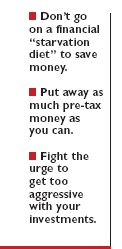Article
Investment Consult
Getting retirement funds back on track

Don't beat yourself up. You've got plenty of company. (To see how your retirement savings compare to your colleagues' our latest survey on doctors' retirement funding.)
The most important advice I can give you is, don't panic. Don't go on a financial "starvation diet" to try to instantly recreate your prior financial situation. It won't work.
Don't count solely on your home's appreciated value to provide retirement funds. Some folks say, "Gee, I didn't save much, but my house is gaining in value and that will give me savings." That may have been true recently, but I'm not sure you'll be able to say that in the future.
To make saving feel like less of a chore, make sure your program fits your temperament. Keep your spending cuts moderate. If you're used to going out to dinner with friends three times a week, don't suddenly resolve to eat canned tuna at home every night, but cut back to once a week, or twice a week at a less expensive restaurant. If your regimen bites too deeply into your lifestyle, you'll probably find a way to rationalize giving up on your efforts.
Tell your friends about your intended cutbacks. Some of you may find this difficult, but supportive friends can help shame you if you stray from your savings program.
One relatively painless savings tip is to save the amount of your annual raise (if you get one) and continue living on your prior income. You won't miss what you never had to spend. It often helps wanna-be savers to put money in separate accounts, each targeted for a particular purpose: one account for the kids' college education, one for your retirement income, etc. That way, you'll feel guilty if you withdraw money early. My clients tell me this is more effective than having simply one amorphous account.
Next, develop a broadly diversified investment portfolio that has the potential to provide the returns you need. Work with your financial adviser or find a model portfolio that gives you a reasonable balance of equity mutual funds and bond funds; typically, about two-thirds in equities for a 50-year-old. It should include large-, mid-, and small-cap funds, value and growth funds, international funds, and some real estate or REITs.
When planning your investments, always choose the most tax-efficient methods. I use the mantra "Pension savings above all." Contributions to your 401(k), profit-sharing plan, Keogh, IRA, or qualified pension plan are best because you're saving pre-tax dollars and the earnings are tax deferred.
I recommend choosing mutual funds based on their performance for the last three-to-five years, by judging returns not relative to the market, but to those of other funds of a similar asset class, such as small-cap, large-cap, etc. I also suggest you narrow the field to those funds that have had the same management team over the same span, because that enables you to more accurately judge what you're getting.





